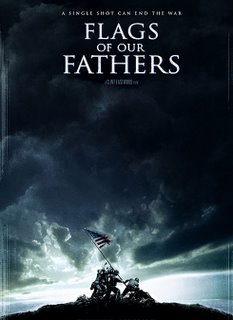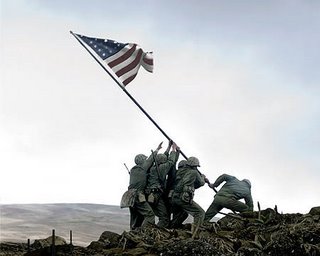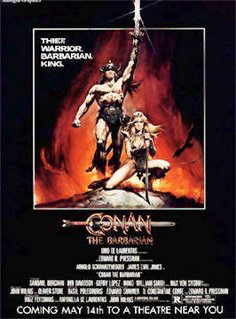
I'm just going to start with simple ideas. What is good about the film is that it debunks long-held beliefs that were the product of wartime propaganda. Not only that, it goes a long way to show the human tragedy of war. It's certainly the best movie to do with war that I've seen since 'Thin Red Line'.
The film is confusing in parts as it flashes back and forth through 3 different time frames, but it's a necessary device to bring into relief the changed cultural circumstances surrounding war. Watching this film, one gets the strong impression that war is indeed created by the abstractions of politicians and generals, but executed in blood by the young. The apparent randomness of the casualties serves as links to tell the story. Sometimes the flashbacks are tedious; other times they leave you wondering about the tangents. I'm not sure it is a successful piece of narrative constrcution but the content more than makes up for its narrative failings. In some ways it is a relief that Eastwood didn't try to tell this story as some neatly book-ended flashback. The frayed ends of the story are left to be re-woven in the minds of the audience and this makes it a more powerful film.
One gets the feeling that both FDR and Harry Truman were pretty awful kinds of opportunists when it came to propagandising; no worse than their oppositions, but definitely playing in the same league. The men who stage the propaganda events in order to raise money through war bonds are portrayed as being just as desperate apparatchiks as their counterparts in the Axes nations. If the violence of war is an ugly business, the effort to raise money for it is even uglier. It's debatable whether these portraits are even fair; I actually don't like either men, so it's nice to see an American director throw rocks at the sacred cows. Especially when it's Clint Eastwood doing the throwin'.
I imagine this film will be a bitter pill to swallow for many Americans.
Iwojima As Propaganda

Consider the fact that the only other significant cinema depiction of Iwojima was 'Sands of Iwojima' starring John Wayne. John Wayne, famously never went to war, so afterwards he spent his energies making war films. That film was 1949. Yet it seems the American military and media have had a lot invested in the events of Iwojima for a long time. For example, "Few Good Men' opens with a shot of the statue depicting the flag-raising on Mount Suribachi. On the Japanese side of the accounts, Iwojima is significant, but nowhere near as important as the events that took place around the Phillippines. They were there because they had to have a forward base and there is not much more to the importance of Iwojima than that.
What is more vexing for both sides is that the value of taking Iwojima has also been disputed through history. In the 'Flags of Our Fathers' film, this is reduced to an armless survivor saying, "That Island saved a lot of lives". Well, that's okay for a movie, but this is what you can find in wikipedia:
Given this bloody sacrifice, the necessity and long-term significance of the island's capture to the outcome of the war was a contentious issue from the beginning, and remains disputed. As early as April 1945 retired Chief of Naval Operations William V. Pratt asked in Newsweek magazine about the "expenditure of manpower to acquire a small, God-forsaken island, useless to the Army as a staging base and useless to the Navy as a fleet base ... [one] wonders if the same sort of airbase could not have been reached by acquiring other strategic localities at lower cost."[4] The Japanese on Iwo Jima had radar with which they notified their comrades at home of incoming B-29s flying from the Marianas. Fighter aircraft based on Iwo Jima sometimes attacked these planes, which were especially vulnerable on their way to Japan because they were heavily laden with bombs and fuel. The island was also used as an air-sea rescue base after its seizure. However, the traditional justification for Iwo Jima's strategic importance to the United States' war effort has been that it provided a landing/re-fueling site for American bombers on missions to and from Japan. As early as March 4, 1945, while fighting was still taking place, the B-29 bomber Dinah Might of the USAAF 9th Bomb Group reported it was low on fuel near the island and requested an emergency landing. Despite enemy fire, the airplane landed on the Allied-controlled section of the island, without incident, and was serviced, refueled and departed. In all, 2,251 B-29 Superfortresses landed on Iwo Jima during the war.That's not much fun to read, especially having watched just how brutal and awful a battle it was in the movie. It is entirely conceivable that the entire bloody campaign was not really justified - but for the image of the flag raising it produced. It's one of the few moments in the Pacific War where the Americans could point and say the flesh was sronger than steel. This brings me to this thought:
None of these calculations played much if any of a role in the original decision to invade, however, which was almost entirely based on the Army Air Force's belief that the island would be a useful base for long-range fighter escorts. For a number of technical reasons these escorts proved both impractical and unnecessary, and only ten such missions were ever flown from Iwo Jima.[5].
----
As for the importance of the island as a landing and refueling site for bombers, USMC Captain Robert Burrell of the US Naval Academy has suggested that only a small proportion of the 2,251 landings were for genuine emergencies, the great majority being for minor technical checkups, training, or refueling. According to Burrell, "this justification became prominent only after the Marines seized the island and incurred high casualties. The tragic cost of Operation Detachment pressured veterans, journalists, and commanders to fixate on the most visible rationalization for the battle. The sight of the enormous, costly, and technologically sophisticated B-29 landing on the island's small airfield most clearly linked Iwo Jima to the strategic bombing campaign. As the myths about the flag raisings on Mount Suribachi reached legendary proportions, so did the emergency landing theory in order to justify the need to raise that flag."[9]
The Riddle of Steel

One of the more under-rated, yet important films of the 1980s, 'Conan The Barbarian' was built around this peculiar abstract dialectic described as 'The Riddle of Steel'. What it boils down to is that The acquisition of steel makes us stronger, but it also weakens us. So with the development of technology our capacity for destruction increases, but we ourselves are weakened by our acquisition of the very technology.
Opposed to this dynamic is the character Thulsa Doom who tells Conan that flesh is stronger than steel. To demonstrate his point, one of Thulsa's followers commits suicide, almost for the purpose of proving Thulsa Doom's point. Thus, according to Thulsa Doom, only flesh can be stronger than steel, but the flesh must be willing to die. If that doesn't describe the battle of Iwojima (and Okinawa), I don't know what does. Keep that in mind as I discuss this notion.
If a man wields a sword, then it is worth asking the question, is the sword stronger than my flesh? Yes. But If I wielded a sword as well, then the test of strength brings it back to my strength versus his strength. Most wars in history up until the industrial revolution were fought on this parity between steel and flesh. That is to say, there is little separating Achilles and Hector as there is in Guan Yu facing off against Lu Bu. The implements of war are nice, but it is the flesh of these men that are pitted against one another. So a sword with a name is at most equal parts important as the wielder.
The American Civil War was the first war to prove the power of steel over flesh. Technological advances by the time of World War I made any individual feat of strength or courage simply did not matter. At that point, war ceased to be heroic. By the end of World War II, it was simply the case that the power of steel so overwhelmed the flesh, there could be no heroes by traditional notions of heroics. After all, what can a group of brave people do when they simply drop a nuclear bomb on you? How can a man be a hero if all they did was survive a meat-grinder of a campaign? The random chances of war become ever more furious in their randomness as the weapons become more devastating. Imagine the God Einstein didn't belive in. Yes, the one who plays dice. In modern war, the God of War shakes his dice as furiously as any Role-playing Gamer.
Thus, to the modern technological world, the power of steel are self evident. The power of steel dovetails with 'boxing smart'. The notion that war is technological is implicit in the strength of steel. In contrast, the strengths of flesh are simple yet compelling - a willingness to die for a cause throws out rational discussions about tactics, strategy or logistics. The power of flesh then, is the ability to 'box tough' - like fictional characters Rocky and Rambo do. Or Conan the Barbarian himself. It is no surprise then that we find both Sylvester Stallone and Arnold Schwarzenegger as huge stars who perpetuate the power of flesh narratives. They succeeded because the world recognised in their fictions the absence of the heroic in our immediate world. Is it any surprise Arnie is a governor of the state of fiction?
Then just who are the people in history who are invested with the power of the flesh? How about the Kamikaze suicide mission pilots? Or the Boxer Rebllion of the 1900s? Or the Vietcong? Or the Palestinian suicide bombers? Whether it is the Kamikaze pilots or the Boxer Rebellion, or even Palestinian suicide bombers, the Western World has trouble dealing with the power of the flesh because the power of the steel makes the wielder weaker. We call those who wield the power of flesh barbaric, because it flies in the face of logic and reason.
However, as the Thulsa Doom dialectic tells us, the man who mows down a row of people with a machine gun is a weaker man than the man who charges the machine gun with, say, a baseball bat. The man who can destroy cities with the push of a button is made weak by that very power. This is evinced by Mikhail Gorbachev's confession to Bono Vox that he never would have pressed that button.
BONO: I just found a really mesmeric man. I asked him about having his finger on all of powers and he said, “You know, all my life I had thought about this and how stupid it was that this” - I think it was called MAD, actually, Mutually Assured Destruction - and he had said, “I knew always that I would never ever use that power.”The man with the power to destroy the world with a swtich is rendered impotent to do it because the extreme fruits of rationality turned out to be madness.
So where does that leave us today? America won World War II so convincingly by boxing smart that it will no longer box tough. The Bush Doctrine established in the early 1990s tells us that America will only go to war if they have an overhwelming advantage, and that they would seek to win through technological superority. By winning WWII, the USA ceased to be barbaric. It will never be able to fight the barbarians who still believe n the power of the flesh - her opponents are still willing to run suicide missions, while the USA itself is starting to think about pulling out of Iraq.
On the one hand you have a population weakened by its very own technological accomplishments. On the other, you have the barbarians at the gate, fully invested in the power of the flesh.

No comments:
Post a Comment